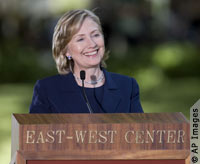
U.S. embassy and consulate websites or www.state.gov.
We’ve gone social!
Follow us on our facebook pages and join the conversation.
12 January 2010
United States Seeks Deeper Ties with Asia-Pacific

Washington — The United States will continue to deepen its strong economic and strategic partnership with the Asia-Pacific region, while Asia has a strong interest in the United States remaining a dynamic partner and stabilizing influence, Secretary of State Hillary Rodham Clinton says.
“The Asia-Pacific region is a fulcrum of global politics and economics. It is central to solving many challenges we face,” Clinton said in a speech January 12 at the East-West Center in Honolulu. “Asian nations are helping to prevent nuclear proliferation in Iran, build schools and clinics in Afghanistan, keep peace in the Democratic Republic of the Congo, and combat piracy off the Horn of Africa.”
The new landscape in Asia requires the United States to build an institutional architecture that maximizes the prospects for effective cooperation, builds trust and reduces the friction of competition, she said. That includes active participation in the Asia-Pacific Economic Cooperation forum, the Association of Southeast Asian Nations, the Trans-Pacific Partnership and other regional and sub-regional groups, she said.
Clinton is on a 10-day trip that will take her to Australia, New Zealand and Papua New Guinea, after her stop in Hawaii for the speech and a one-on-one meeting with Japanese Foreign Minister Katsuya Okada. The trip is intended to illustrate the emphasis President Obama places on strong ties to key allies such as Japan and Australia, and that the United States is not a visiting partner to the region, but a resident partner in the region.
Clinton outlined five principles that will guide the United States’ continued multilateral engagement and leadership in the region. The first is that the “United States’ alliance relationships are the cornerstone of our regional involvement.” She said the security and stability provided through these relationships have been critical to the region’s success and development.
The second principle is that regional institutions should work to advance clear and increasingly shared objectives, she said. These shared objectives include economic opportunity and growth, and fostering democracy and human rights, she added.
“To promote regional security, we must address nuclear proliferation, territorial disputes and military competition — persistent threats of the 21st century,” Clinton said.
Advancing economic opportunity, she said, means focusing on lowering trade and investment barriers, improving market openness, and promoting balanced, inclusive and sustainable patterns of economic growth. These are among the goals outlined by the United States and its partners in the Group of 20 advanced and emerging economies in two summits last year, and were featured in the recent meeting of APEC.
The third principle requires the institutions of the region to be focused on delivering results. “The formation and operation of regional groups should be motivated by concrete, pragmatic considerations,” she said. “It’s more important to have organizations that produce results, rather than simply producing new organizations.”
And fourth, Clinton said, the United States and its Asia-Pacific partners must enhance their flexibility in pursuing results, which may mean informal arrangements targeted to specific challenges, such as efforts by the Six-Party Talks that seek to denuclearize the Korean Peninsula. The Six-Party Talks include China, North Korea, South Korea, Japan, Russia and the United States.
Finally, she said that as Asia-Pacific nations, “we need to decide … which will be the defining regional institutions to best protect and promote our collective future.” While each organization has its purpose, each also has varying degrees of importance in the regional architecture. The most likely mix is of well-established and new organizations, Clinton said.
(This is a product of the Bureau of International Information Programs, U.S. Department of State. Web site: http://www.america.gov)
